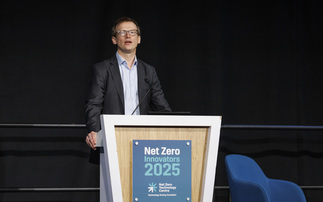New reports P reveal investors are turning to ESG products in search of 'improved long-term returns', but hurdles remain as the trend continues its march into the mainstream
The myth that investing in companies with strong environmental credentials means foregoing attractive returns was dealt a dual blow today, after two new reports revealed growing confidence across the investment community that assets boasting impressive environmental, social, and governance (ESG) performance are delivering strong financial returns.
BNP Paribas Securities Services today published the results of a new survey of nearly 350 asset owners and managers, detailing their attitudes towards ESG issues and the maturity of their ESG strategies.
It found consideration of ESG factors is increasingly embedded within asset owners and managers' activities, as more firms recognise the attractive returns and improved risk management a strong ESG performance can deliver.
The poll found 75 per cent of asset owners and 62 per cent of asset managers hold more than a quarter of their investments in funds incorporating ESG - a sharp increase on the 48 per cent of owners and 53 per cent of managers who targeted more than a quarter of their investments at ESG products when the survey was last undertaken in 2017.
Significantly, 52 per cent of respondents now rank 'improved long-term returns' in their top three reasons for ESG investment, while 60 per cent of all respondents expect their ESG portfolios to outperform the wider market over the next five years.
The survey also revealed a significant number of investors are taking a holistic and wide-ranging approach to ESG engagement. For example, nearly two thirds said their investment framework was now aligned with the UN's Sustainable Development Goals (SDGs), while nearly a quarter state that ESG capability is embedded across their entire organisation.
Speaking at a roundtable event this morning to launch the new report, Florence Fontan, head of asset owners at BNP Paribas Securities Services, said there had been an encouraging step change in investor engagement with ESG issues.
"In 2017 there was a lot of intention, but not as much action," she said. "Just two years on and the survey shows a big acceleration. There's a lot of action. A 27 percentage point in just two years in the number of investors with more than 25 per cent of their assets in funds that have ESG elements is significant."
She added that there was now a "strong conviction" amongst many investors that ESG contributes to sustainable financial performance.
The survey results come on the same day as ratings agency giant S&P published a new report entitled The ESG Advantage: Exploring Links To Corporate Financial Performance. It concludes that research into the links between ESG and financial performance remains relatively immature, but there is increased investor interest in ESG funds and products and growing confidence they deliver attractive returns.
The report notes that assets invested according to ESG-related strategies hit $30tr in 2018 and predicts that "mounting awareness of ESG issues, investor demand for ESG products, regulations around improved disclosure, and momentum generated by investor commitments to the UN's Principles for Responsible Investment will contribute to the growth of ESG-linked investments over the coming years".
"Some empirical data suggest ties between strong performance on environmental, social, and governance (ESG) factors and improved corporate financial performance and investment returns," the report states. "However, the findings are largely mixed, and relatively few studies have explored these dynamics outside the equity field."
But it also notes that "companies focusing on ESG issues have achieved reduced costs, improved worker productivity, mitigated risk potential, and created revenue-generating opportunities".
Both reports highlight that challenges remain for those asset owners and managers keen to step up their engagement with ESG investment.
Demand for green bonds is typically outstripping supply, while BNP Paribas' survey also reveals how a growing number of asset managers are having to recruit from outside of the traditional financial services sector to access the skills required to analyse ESG trends and performance.
In addition, the survey highlights how access to accurate and comparable ESG data remains a major challenge for many investors, especially when considering a company's social performance or supply chain impacts. Fully two thirds of respondents identified data as the biggest barrier to ESG integration in their organisation, up from 55 per cent two years ago.
A host of analyst houses and ratings firms have introduced new ESG services in recent years and the report notes how emerging AI, machine learning, and blockchain technologies promise to provide increasing levels of ESG data in the future. For example, a recent Harvard Business School study used data from fintech firm Truvalue Labs, which employs AI natural language processing to browse through the web on a real-time basis, automatically extracting ESG information on companies. According to the Harvard study, the combination of AI-generated ESG data with traditional ratings led to a 4-5 per cent increase in alpha annually.
Similarly, the new reports come in the same week as S&P Dow Jones Indices debuted its new S&P 500 ESG Index, hailing it as "an innovative index that is aligned with ESG selection guidelines and designed to closely replicate the risk and return profile of its most iconic benchmark".
Reid Steadman, global head of ESG indices at S&P Dow Jones Indices, said the new service was in response to growing investor demand. "An increasing number of investors require indices that are aligned not only with their investment goals but also their individual and institutional values," he said. "The S&P 500 ESG Index is constructed with both of these needs in mind. Unlike many ESG indices that preceded it - which were more thematic or narrower in their focus - the S&P 500 ESG Index is broader and developed to target the core of an investor's portfolio."
But despite growing engagement with ESG data and performance across mainstream investment markets, concerns remain over the quality and reliability of some of the data and methodologies used - concerns that are only amplified by the on-going inclusion of some highly polluting firms in some ESG funds and indices.
Charlotte Hormgard, senior manager at AP3, notes that "access to data" remains a challenge for the ESG sector. "There is lots of data," she is quoted as saying in the report. "The challenge is finding the right data in the right format and knowing how to use it."
There is also a broad agreement that a more standardised approach to reporting ESG data is required. "I believe data on sustainability is now viewed in a similar way to how financial data was treated around 75 years ago," Andreas Feiner, founding Partner at Arabesque, is quoted as saying in the report. "This has resulted in a situation where some companies avoid disclosing some information that would potentially show them in a negative light."
Frank Roden, head of asset managers for EMEA at BNP Paribas Securities Services, joked that it would not take 75 years for ESG investors to overcome the current data challenges given the learning curve established through financial reporting rules. Moreover, there are growing signs that regulators are seeking to standardise ESG reporting, as evidenced by the EU's wide-ranging Action Plan on Sustainable Finance and similar initiatives in Asia. But different reporting rules across different jurisdictions coupled with an explosion in 'big data' ESG services will create their own challenges for investors to navigate.
Meanwhile, pressure from investors looks set to intensify as concerns over climate risks escalate. Separately today a new report from consultancy giant Mercer argues that there is an urgent need for investors to step up their support for companies and projects that are compatible with the Paris Agreement's goal of keeping temperature increases below 2C or risk significantly worse returns as climate impacts intensify.
"A key conclusion is that investing for a 2C scenario is both an imperative and an opportunity," said Helga Birgden, global business leader for responsible investment at Mercer. "It's an imperative, since for nearly all asset classes, regions and timeframes, a 2C scenario leads to enhanced projected returns versus 3C or 4C and therefore a better outcome for investors. It's an opportunity, since although incumbent industries can suffer losses in a 2C scenario, there are many notable investment opportunities enabled in a low-carbon transition. The modelling shows that greater inclusion of sustainable assets into portfolios can enhance returns."
The evidence has never been clearer that investing in companies with strong ESG credentials offers both attractive returns and positive real world impacts. As Trevor Allen, sustainability research analyst at BNP Paribas, observed ESG investment will ultimately be a big determining factor over whether or not countries deliver on both the SDGs and the national climate action plans submitted under the Paris Agreement. Yet there are still plenty of hurdles to be cleared if ESG investment is to continue to accelerate its march into the mainstream.









